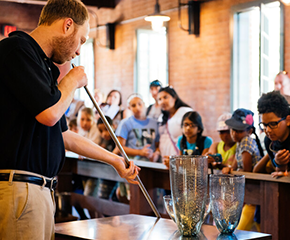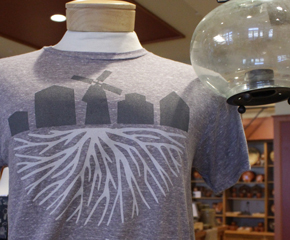Wool Wheel, Made in the Shaker Community in Canterbury, New Hampshire, 1807-1847
Add to SetSummary
Spinning fibers into yarn for weaving into cloth was an important task in many households into the 19th century. Spinning, done by women and girls, was a skilled -- and labor-intensive -- task. The woman who operated this large wool wheel spent countless hours walking to and fro, alternately spinning the wool fibers into yarn and then winding it onto the spindle.
Spinning fibers into yarn for weaving into cloth was an important task in many households into the 19th century. Spinning, done by women and girls, was a skilled -- and labor-intensive -- task. The woman who operated this large wool wheel spent countless hours walking to and fro, alternately spinning the wool fibers into yarn and then winding it onto the spindle.
Artifact
Spinning wheel
Date Made
1807-1847
Creators
Shakers, Canterbury Community (Canterbury, N.H.)
Place of Creation
United States, New Hampshire, Canterbury
Creator Notes
Made in the Shaker Community in Canterbury, New Hampshire, of which Francis Winkley was Trustee. The accelerating head, which is not original to this wheel, was patented by Amos Miner.
Keywords
Collection Title
Location
Not on exhibit to the public.
Object ID
2017.84.158
Credit
From the Collections of The Henry Ford. Gift of American Textile History Museum, donated to ATHM by North Andover Historical Society.
Material
Wood (Plant material)
Metal
Leather
Technique
Turning (Shaping process)
Dimensions
Height: 59.25 in
Width: 66 in
Length: 22 in
Inscriptions
end of table: F. W.





